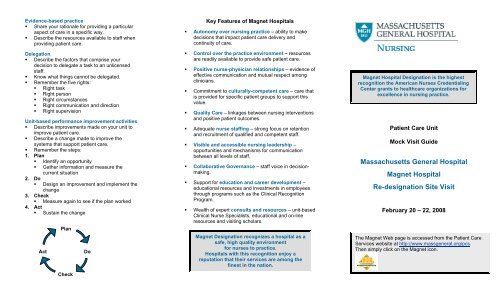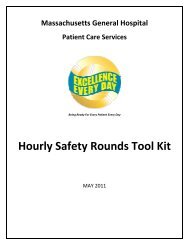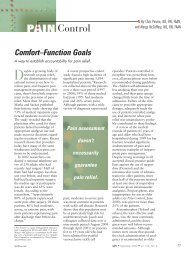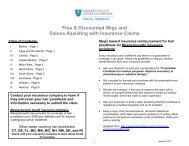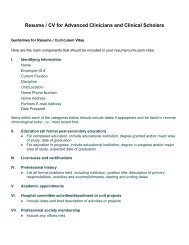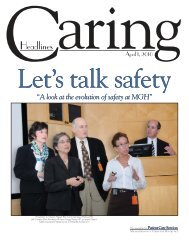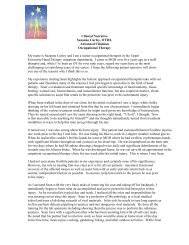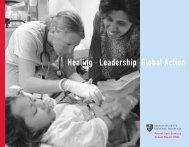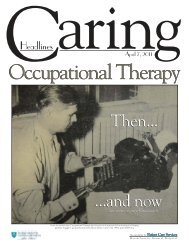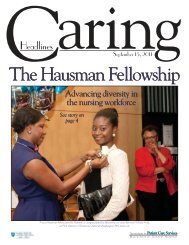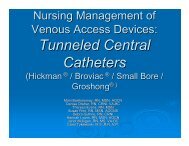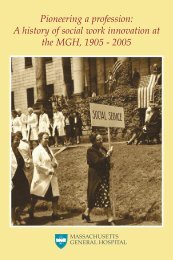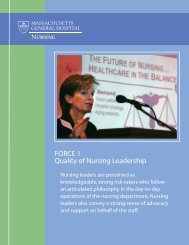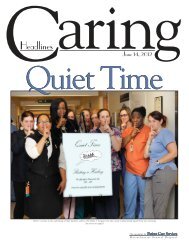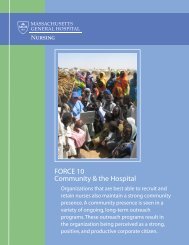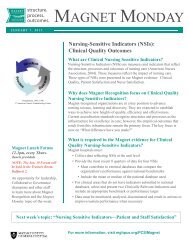Magnet Mock Visit Brochure - Mghpcs.org
Magnet Mock Visit Brochure - Mghpcs.org
Magnet Mock Visit Brochure - Mghpcs.org
You also want an ePaper? Increase the reach of your titles
YUMPU automatically turns print PDFs into web optimized ePapers that Google loves.
Evidence-based practice<br />
• Share your rationale for providing a particular<br />
aspect of care in a specific way.<br />
• Describe the resources available to staff when<br />
providing patient care.<br />
Delegation<br />
• Describe the factors that comprise your<br />
decision to delegate a task to an unlicensed<br />
staff.<br />
• Know what things cannot be delegated.<br />
• Remember the five rights:<br />
• Right task<br />
• Right person<br />
• Right circumstances<br />
• Right communication and direction<br />
• Right supervision<br />
Unit-based performance improvement activities<br />
• Describe improvements made on your unit to<br />
improve patient care.<br />
• Describe a change made to improve the<br />
systems that support patient care.<br />
• Remember the steps:<br />
1. Plan<br />
• Identify an opportunity<br />
• Gather information and measure the<br />
current situation<br />
2. Do<br />
• Design an improvement and implement the<br />
change<br />
3. Check<br />
• Measure again to see if the plan worked<br />
4. Act<br />
• Sustain the change<br />
Plan<br />
Act Do<br />
Check<br />
Key Features of <strong>Magnet</strong> Hospitals<br />
• Autonomy over nursing practice – ability to make<br />
decisions that impact patient care delivery and<br />
continuity of care.<br />
• Control over the practice environment – resources<br />
are readily available to provide safe patient care.<br />
• Positive nurse-physician relationships – evidence of<br />
effective communication and mutual respect among<br />
clinicians.<br />
• Commitment to culturally-competent care – care that<br />
is provided for specific patient groups to support this<br />
value.<br />
• Quality Care – linkages between nursing interventions<br />
and positive patient outcomes.<br />
• Adequate nurse staffing – strong focus on retention<br />
and recruitment of qualified and competent staff.<br />
• Visible and accessible nursing leadership –<br />
opportunities and mechanisms for communication<br />
between all levels of staff.<br />
• Collaborative Governance – staff voice in decisionmaking.<br />
• Support for education and career development –<br />
educational resources and investments in employees<br />
through programs such as the Clinical Recognition<br />
Program.<br />
• Wealth of expert consults and resources – unit-based<br />
Clinical Nurse Specialists, educational and on-line<br />
resources and visiting scholars.<br />
<strong>Magnet</strong> Designation recognizes a hospital as a<br />
safe, high quality environment<br />
for nurses to practice.<br />
Hospitals with this recognition enjoy a<br />
reputation that their services are among the<br />
finest in the nation.<br />
<strong>Magnet</strong> Hospital Designation is the highest<br />
recognition the American Nurses Credentialing<br />
Center grants to healthcare <strong>org</strong>anizations for<br />
excellence in nursing practice.<br />
Patient Care Unit<br />
<strong>Mock</strong> <strong>Visit</strong> Guide<br />
Massachusetts General Hospital<br />
<strong>Magnet</strong> Hospital<br />
Re-designation Site <strong>Visit</strong><br />
February 20 – 22, 2008<br />
The <strong>Magnet</strong> Web page is accessed from the Patient Care<br />
Services website at http://www.massgeneral.<strong>org</strong>/pcs.<br />
Then simply click on the <strong>Magnet</strong> icon.
What is the purpose of the site visit<br />
The site visit evaluates the hospital’s performance<br />
on its continued ability to develop programs and<br />
initiatives that are enculturated throughout the<br />
hospital. It is an opportunity for staff to showcase<br />
the excellent care they provide to patients and<br />
families at MGH.<br />
How many units will be visited<br />
The goal is to visit as many units and practice<br />
areas as possible.<br />
Who will the appraisers talk to during the unit<br />
visits<br />
• Staff throughout MGH will have an opportunity<br />
to interact with the appraisers in a number of<br />
forums scheduled throughout the site visit.<br />
Appraisers may speak with any member of the<br />
MGH community. All employees should have a<br />
basic understanding of the <strong>Magnet</strong> recognition<br />
process and be able to describe how their<br />
department works in collaboration with nursing.<br />
• Appraisers will want to meet with members of<br />
the interdisciplinary team about how clinical<br />
practice is delivered and supported.<br />
• Appraisers may request to speak with patients,<br />
families and visitors.<br />
What are the appraisers looking for during the<br />
unit visit<br />
Key areas of focus that staff will be asked to speak<br />
to:<br />
• Interdisciplinary, patient- and family-centered<br />
care demonstrated through practice<br />
• Continuity of the patient’s plan of care<br />
• Collaborative nurse/physician relationships<br />
• Staff involvement in unit decision-making<br />
• Integration of quality initiatives<br />
• Evidence-based practice<br />
• Delegation and teamwork<br />
• Unit-based performance improvement activities<br />
Making staffing decisions<br />
The MGH Patient Care Delivery Model:<br />
• Describe how staffing decisions are:<br />
interdisciplinary, patient- and family-centered care. • Made at the unit level<br />
• Based on patient acuity<br />
Care planning and documentation<br />
• Describe the plan of care your patient is receiving.<br />
• Ensure that the documentation of the care reflects<br />
MGH standards.<br />
• Identify a patient that could be visited by an appraiser if<br />
requested.<br />
Continuity of care<br />
• Interdisciplinary teamwork is featured in our <strong>Magnet</strong><br />
evidence; the record should reflect input by all<br />
clinicians to maximize continuity of care.<br />
Your <strong>Magnet</strong> Ambassadors, Champions and unit<br />
leadership are available<br />
Professional development<br />
• New staff members may be asked to describe their<br />
orientation program.<br />
• New graduates may be asked about their transition<br />
from student into professional practice.<br />
• Preceptors may be asked to describe their role in<br />
teaching new nurses, support staff, employees or<br />
students.<br />
• Resources that support professional development<br />
include:<br />
• Continuing Education opportunities (central and<br />
unit-based)<br />
• Paid time to attend offerings<br />
• Tuition assistance to advance education<br />
• Flexible staffing to accommodate school schedules<br />
• Clinical Recognition Program<br />
• Specialty certification<br />
• Clinical experts (central and unit-based) e.g.,<br />
CNSs, Nurse Practitioners, Clinical Educators and<br />
clinicians from other disciplines<br />
• Simulation<br />
• Web-based learning<br />
• Based on the competency of available staff<br />
Interdisciplinary teamwork<br />
• Different disciplines routinely participate on teams<br />
to identify opportunities to improve care. Describe<br />
the teams in place to address the care on your unit.<br />
• Interdisciplinary team rounds are an important part<br />
of the excellent care provided at MGH. Appraisers<br />
are interested in observing teams in action and in<br />
seeing evidence of teamwork in the patient record.<br />
Quality focus<br />
• rL Solutions, the web-based incident reporting<br />
system improves patient care and increases patient<br />
safety by providing and efficient, accurate and<br />
timely safety reporting system.<br />
for more detailed information. • Nursing Sensitive Indicators as defined by the<br />
ANA, are monitored and include prevalence of<br />
patient falls and pressure ulcers; patient<br />
satisfaction with pain management, education and<br />
overall care; and infection rates.<br />
• The Center for Innovations in Care Delivery, one of<br />
the Centers within the Institute for Patient Care,<br />
offers resources and support to nursing and<br />
interdisciplinary teams to identify opportunities to<br />
improve care, evaluate its impact and improve care<br />
delivery.<br />
Variables that create magnetism include:<br />
An adequate number of superbly competent,<br />
educated nurses supported by an administrative<br />
team that has built a culture that values quality<br />
patient care and supports the values of collegial<br />
nurse-physician relationships, clinical autonomy,<br />
and control over nursing practice.<br />
McClure et. al., 2002


